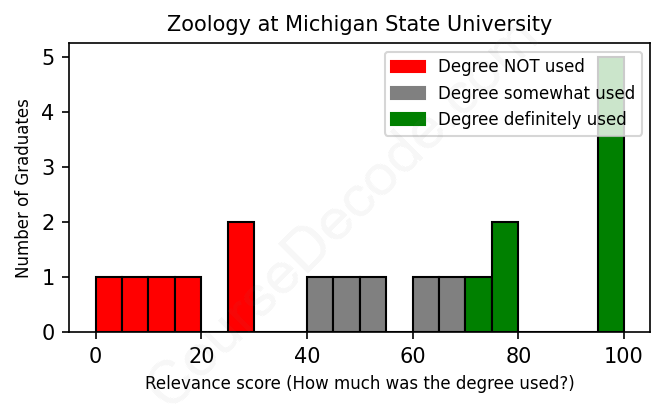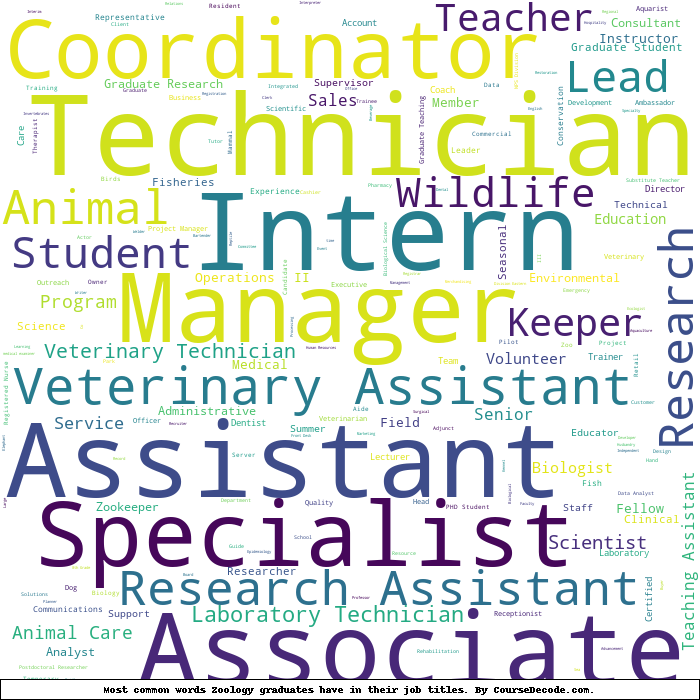
First, some facts. Of the Zoology graduates from Michigan State University we've analyzed , here's how many have used (or NOT used) their degree in their career:

These are estimates based on AI analysis of 19 LinkedIn profiles (see below).
The verdict? Significantly below average. Overall, with an average relevance score of 56%, Zoology graduates from Michigan State University have a much lower likelihood (-11%) of finding work in this field compared to the average graduate across all fields:
And for comparison, here's the chart for all profiles we've looked at across all degrees.
Also, after graduating, 57% of these graduates have pursued further education other than another Bachelor's degree (such as a Masters degree or other), compared to the average across all profiles of 35%. This suggests you may need more than just a Bachelors degree to be competitive as a Zoology graduate.
See the details:
|
Relevance score: 62% We think this person has gone into a career only somewhat relevant to their degree. We think this person has gone into a career only somewhat relevant to their degree.
DEGREE INFOGraduated in 2022 from Michigan State University with a Bachelor of Science - BS in Zoology. No other secondary education since. JOB HISTORY SINCE GRADUATIONVeterinary Technician University of Michigan - Ann Arbor Jan 2023 - Jul 2023 Art Direction Intern  Imagination May 2024 - Present BLAC Intern  BLAC Internship Program May 2024 - Present ABOUTHello! I recently just graduated from Michigan State University with a degree in zoology! Currently Im trying to get my zoology and art careers started. I have an interest in animal behavior and observation and Im willing to do more in the field. Luckily, Im also a talented artist and have created examples of signs and exhibit designs for zoos during school. Fortunately I have also written many highly acclaimed scientific papers about apes and primates, the two animals Im most interested in studying further although I'm open to everything. In my free time I'm constantly drawing and creating art. So much so that I have gained a decently sized following of people who absolutely love my style. However my arts purpose isn't to get views and likes, I mainly create it because it allows for creative freedom, something that isn't as common in the science field. Currently I am a freelance artist that focuses on portraits, character and graphic design along with concept art.I am also the creator of a group dedicated to uplifting and supporting young POC artists! (Currently as of 10/23/23 we have 430 members!) If your interested in getting in contact send me an email at [EMAIL REMOVED]! |
The top 10 most common jobs done by the graduates we've analyzed (ranked most common to least) are:
When looking at the careers that Michigan State University Zoology graduates have pursued, it’s clear there’s a mixed bag of relevancy to their degree. Some have found their niche in animal care or veterinary roles, such as becoming Animal Care Technicians, Veterinary Assistants, or even Mammal Keepers. These positions are a fantastic fit for those who studied Zoology, as they directly apply the skills and knowledge related to animal biology and behavior. Others, like those working as Infection Preventionists or in roles tied to healthcare management, leverage their biological know-how, making their work fairly relevant too.
However, a significant portion of these graduates have ventured into jobs that don't make much use of their Zoology background at all. Many have shifted into sales, management, and other fields like event planning and administration where the expertise gained in Zoology isn’t really needed. While it’s great that these individuals have found work, it raises questions about how effectively Zoology degrees prepare students for the job market outside of directly related fields. It’s a reminder that while a degree in Zoology opens some doors, it doesn’t guarantee that all career paths will be closely connected to the animal sciences.
Here is a visual representation of the most common words in job titles for Zoology graduates (this is across all Zoology graduates we've analyzed, not just those who went to Michigan State University):

When we look at the career trajectories of Zoology graduates from Michigan State University, it’s pretty clear that there’s a mix of outcomes. Right out of college, many folks land jobs that relate to animal care and veterinary services, which makes sense given their degree. For example, recent grads have taken roles as veterinary technicians, animal care specialists, and even zookeepers. However, not all graduates stay within the biological sciences field. Some have ended up in quite different areas, like human resources, project management, or even sales positions. This suggests that while they start off aligned with their zoological training, they may pivot towards other industries as they gain experience.
Looking five or ten years down the line, many graduates move into managerial roles or specialized positions within health and animal care sectors, like being a physician assistant or managing animal care in aquariums or wildlife facilities. Still, a fair number transition entirely to non-zoological careers, reflecting a trend where the skills learned in a Zoology program—like critical thinking and research—are valued in various fields. In short, although many graduates find fulfilling paths related to their degrees, a significant number veer off into entirely different careers, which illustrates the versatile nature of a degree in Zoology. It’s a mixed bag, but with some exciting possibilities!
Getting a Bachelor’s degree in Zoology at Michigan State University can be a pretty challenging experience, but it's definitely manageable if you’re passionate about animals and biology. The coursework can get rigorous, especially when diving into subjects like genetics, ecology, and animal physiology, and you'll have to spend a good chunk of time on labs and fieldwork, which are crucial parts of the program. Some students might find it tough to juggle all the content and the science-heavy classes, but if you stay organized and keep up with your studies, it isn’t considered harder than average compared to some other science degrees. Overall, it’s a solid journey for those who genuinely love learning about the animal kingdom!
Most commonly, in the LinkedIn profiles we've looked at, it takes people 4 years to finish a Bachelor degree in Zoology.
So, when you look at this list of Zoology grads from Michigan State University, you can see a bit of a mixed bag when it comes to their earnings. Some of them—like those who got into health care as Physician Assistants—probably make decent money since those roles tend to pay well, especially compared to others who worked more traditional zoo or animal care jobs. Others, particularly those still in entry-level or assistant roles in veterinary settings, might be on the lower end of the pay scale for a while. Those transitioning into corporate roles, like in sales or project management, seem to be moving towards higher earnings, especially as they climb the ladder. But overall, it seems like if they keep moving forward and gaining experience, they’ve got a good shot at making some decent cash down the line!
Here is a visual representation of the most common words seen in the "about" section of LinkedIn profiles who have a Bachelor degree in Zoology (this is across all Zoology graduates we've analyzed, not just those who went to Michigan State University). This may or may not be useful:

Here are all colleges offering a Bachelor degree in Zoology (ordered by the average relevance score of their Zoology graduates, best to worst) where we have analyzed at least 10 of their graduates:
| College | Score | Count |
|---|---|---|
 North Carolina State University North Carolina State University
|
74 | 11 |
 Miami University Miami University
|
72 | 13 |
 Colorado State University Colorado State University
|
67 | 10 |
 Michigan State University Michigan State University
|
56 | 19 |